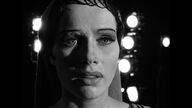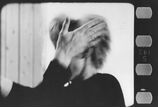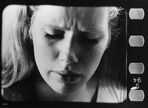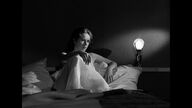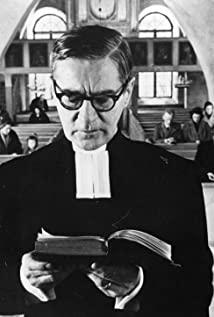1945) is already a pinnacle. Many European directors have embarked on a new narrative style exploration road in order to find other possibilities of film expression, such as a series of masterpieces spawned by the French New Wave movement in the late 1950s, and 60 In the early years, directors such as Aaron Rene and Fellini emphasized the use of abstract film language and the way of expression that put psychological "consciousness" before "plot", which had a profound impact on later works. In 1957's "Wild Strawberry", Inma Bergman tried to organize the spiritual journey of time and space according to the logic of dreams. However, it was not until this stage of conceiving the filming of "Persona" that he was more "relaxed". "Open" and use avant-garde expressions (above "logic") to explore the chaos and contradictions in people's inner world. In order to highlight the changes in the protagonist’s mental state, Inma Bergman referred to the form of an indoor drama in "Mask" and started a spiritual communication with the audience (he started from "The Mirror of the Mirror", "The Trilogy of Faith" "Inside, I already like to adopt a similar form). The enclosed space of the indoor drama is more suitable for exploring the claustrophobic dilemma of the characters, and the cold hospital, small island (known as Bergman Island), uninhabited seaside and huts in "Mask" form an environment that isolates the outside world. The suggestive effect of the character's loneliness and helplessness also allows the audience to focus more on the protagonist's emotional ups and downs. Inmar Bergman's "Mask", the subject matter is partly derived from Strindberg's script "The Stranger (The Stranger)" Stranger)”, in “Stranger”, Mrs. X keeps monologues, just like the nurse Alma in “Mask” talks to herself; and whether Mrs. Y is a real person or Mrs. X is split in humanity The question is similar to the doubt about whether the two heroines of "Mask"-Elisabeth and Alma are the same person (the movie name Persona means "second me" in literary creation). When watching "Mask", the audience may first think that the ambiguous relationship between Alma and Elisabeth is like Lesbian; but after Elisabeth’s husband came and misidentified Alma as Elisabeth, and then had an unreasonable intimacy with Alma (the real Elisabeth was watching it) , The idea of "two people are two clones of the same individual" will sprout from the bottom of my heart. In one scene, the director used impressionistic images (haze and fog) to set off Elisabeth's movement into Alma's room and tugged her hair; but the next morning, Alma asked Elisabeth if he had visited me last night , Elisabeth shook his head and denied. This plot created doubts about whether the seaside cottage, the arrival of Elisabeth's husband, and even Elisabeth, who was seen in front of him, was a self-imaginary fantasy by Alma. Inma Bergman deliberately creates the inseparability between "dream" and sobriety in the film, blurring the boundary between reality and illusion, and also blurring the boundary between Alma and Elisabeth. This includes several shots of Elisabeth falling asleep and waking up, which makes people feel that the next episode may happen in her dream, and after Alma's long narrative of the relationship between Elisabeth's mother and child, the director put their two faces together. , There is a hint of blurring the difference between the two, which adds to the confusing nature of the movie. The post-modern beginning of "Mask" presented through montage is the key to a deeper understanding of the film. It started with two bright spots (two carbon rods of arc lights) gradually expanded, followed by cartoons that were stuck, clips of silent comedies (seems to be from Chaplin's work), spiders (by Yingma Bao) Important symbols of Mann’s early films are reminiscent of Inmar Bergman’s "The Mirror Puzzle"), the eyes of a sheep (reflecting the surrealism of Luis Buñuel’s "The Dog of Andaru"), and nailing with a hammer. The nail in the palm (symbolizing Christianity), the Swedish winter forest, the rigid and sharp railing, the dead body, the last set of shots switch at a normal speed: a thin and sick boy, Lying on his stomach on a small bed against the wall in an empty hospital room, the pale white picture reminds the audience of the morgue in front, but afterwards the little boy touched a large, fuzzy female face (representing the mother's body), and It makes people feel that this space is like inside a human womb. Inma Bergman wants to lay out the prelude to the movie in this way, just like shuffling the cards, quickly replaying (washing off) the propositions (spider, religion...) he discussed in the previous movies, he deconstructed himself, and rebuilt himself, like a life The farewell of the previous paragraph (morgue), and at the same time a new self (new proposition to be discussed) will also appear (womb). Before the filming of "Mask", Inma Bergman had a serious illness, which may cause him to have more views on life and movies. In the inner world of the person). The little boy who could not sleep in the hospital bed represented himself who was sick at that time, and also represented himself who was a little uneasy at that time. Bergman once mentioned this impressive experience in an interview in 1970: He was under anesthesia for surgery, which made him enter a state of vagueness and chaos, and felt that his consciousness was gradually disappearing, but there was a kind of relief. Pleasure. Inma Bergman visualized this "fuzzy" state in the identity of the little boy, which caused people to wonder if the little boy was really Elisabeth's son? Why does his glasses-wearing action with Alma connect me? In addition, the female face touched by the little boy is also "blurred". The two faces of Alma and Elisabeth appear alternately, but it is difficult to recognize them all at once. Bibi as Alma Andersson once said that he couldn't even tell who the pieced face was for a moment, and I think Inma Bergman also expressed the idea of "consciousness separated from reality" through a series of "confused" images. . The surface of "Mask" begins with "fun and mystery", conveying one of the core ideas of the film: that is to be beyond reality to see through reality and break the mask on the face. According to Freud's theory, the subconscious mind has an action function. It actively exerts pressure and influence on people's character and behavior, and plays a more decisive role than consciousness (self). And the "surreal" of "Mask" is like the "superego" in the subconscious, which can release the vitality of thoughts and feelings (like Inma Bergman's relief after being anesthetized), and it can make people see through things/things. The true. Reality makes people hypocritical. In the film, Elisabeth himself is an actor, and the original meaning of the Greek word "persona" is the mask on the actor's face. When Elisabeth chooses to leave the stage and escape from the sea, it means that she has decided to leave the reality and tear up her mask; but the originally optimistic and healthy Alma is driven by the "reality", becoming more suspicious, moody, and less and less. Normally, they seem to have changed their identities in the end. Everyone can see who the real patient is. According to my understanding, it is not too important whether Elisabeth and Alma are the same person. Inma Bergman wanted to use the two to form two close bonds, giving the symbolism between reality and surreal (or reality and illusion), and this symbolism has influenced later generations of movies (including Robert Altman's " 3 Women"), became a more important value manifestation in "Mask". The film cleverly uses the "erotic" link to enhance the closeness of the two, like Alma confided to Elisabeth of an unexpected dating experience at the beach, as if to tell the most hidden secret in the heart to a close lover. Alma’s entire narrative does not have a flashback shot, thus creating a strong erotic atmosphere, according to Liv Ullmann recalled that she also heard a lot of sexual desire at the scene at the time, and her expression of enthusiasm was from the heart rather than acting. In addition, Alma's close observation of Elisabeth and the scene where Elisabeth strokes Alma's forehead and hair are also a manifestation of the two people's close inner harmony. Alma's illusion scenes and real plots merge with each other, and her subjective imagination is confused with reality, just as the appearance of the two heroines is a bit similar from the beginning, until they overlap and the difference between the two is blurred by the director. There is a deep line in "Mask". Inma Bergman borrowed from the psychiatrist to explain the reason for Elisabeth's silence: "Survival is a hopeless dream. Stay vigilant every second and pay attention to your surroundings. At the same time, , There is an abyss between you in the eyes of others and you in your own hearts. Every tone is a lie, a deception, every gesture is false, every smile is a grimace, you can keep it Silence, at least you don’t have to lie; you can live alone and lock yourself up, so you don’t have to play a role, you don’t have to pretend, you don’t have to make false gestures.” In the movie, we can first regard "language" as a representative symbol of "reality" (this "reality" has two meanings, one is the reality that has to be adapted to life, and the other is its existence). Elisabeth chose silence, which is the beginning of tearing off the mask of reality. The mysterious and inaccessible image in front of her caused the audience to feel pity. On the contrary, Alma, who has been nagging constantly, is expressed by words. Desire is at work, slowly making her more calculating, more unfathomable than Elisabeth. Alma could not extricate herself from talking, becoming more of a burden and cumbersome. Her words and Elisabeth's silence also replaced her, making me feel that "language" would become a kind of nothingness (previously "silence" represented nothingness). In the climax part of Alma's story about the relationship between Elisabeth's mother and son, Inma Bergman vividly demonstrated the multiple connotations of "transformation" in his film with two paragraphs of the same dialogue with different shooting angles and different lighting. This "conversion" is a 180-degree conversion of the lens, and also a conversion of identity. Alma describes how Elisabeth hates children and how he doesn't want children. In fact, he is also talking about her own past (Alma said that the sex on the beach made her Became pregnant, and later she chose to have an abortion). Alma, who is addicted to delusions, makes people feel hypocritical, but the audience is preconceived and thinks that Alma has imagined Eli. Sabeth, however, became more and more real, the transition between "false" and "real", as well as Alma's non-stop monologue as mentioned before. From the beginning, her self-confidence gradually seemed a little overwhelmed. In the end, she His nonsense made the story fragmented, and "speaking" seemed vulnerable in front of "silence." Some commentators have pointed out that the two heroines are like vampires. When Elisabeth mysteriously walked into Alma's room in the mist, or later changed, Alma went to Elisabeth's room and observed her intimately, just like a vampire "action." Before the action. The most obvious description is the blood-sucking shot of the virgin protagonist near the end, just like an artist's grabbing. Actress Elisabeth consciously wants to control, or more seriously, to play with and destroy Alma, which implies the artist's habit of making things difficult, like the desire to squeeze the vitality of others to inspire inspiration, just like a vampire; but in the back, it "destroys." Another "conversion" occurred, manifested in Alma's oppression of Elisabeth in terms of language or action. The film involves elements of violence. If Elisabeth and Alma may be the same individual, they are torturing themselves. From the perspective of "self" that Inma Bergman observes, he stands in the above-mentioned surreal position to analyze one of the truths of complex human nature, and it is like confessing to the priest and expressing the most honest thoughts in his heart. He used the role of Elisabeth to represent himself. When Alma scolded Elisabeth for being too self-righteous, it was actually the director's blame and reflection on himself. "Mask" has many memorable facial close-ups, all showing mixed emotions such as struggle and confusion. Like the first long-shot close-up of Liv Ullmann, with the gradual dimming of the light, one walks into unknown territory; in addition, when Elisabeth’s husband was intimate with Alma, half of Liv Ullmann’s face appeared in front of the lens, which is also understandable. Half of adult sex is always a dark display; and when Elisabeth listens to Alma’s story about her mother-child relationship, Liv Ullmann's expression is richly changed from a bit of evil to pain, which sums up the transformation of her "role"; to the end, a split face, one person talking, one person's mouth move, and the image is abstracted. These close-ups of Inma Bergman all have a fear of modernity. Some outstanding movies in the 1960s will unconsciously reveal similar concerns about the atomic age, such as the works of Michelangelo Antonioni and Resnai’s "Last year in Marumba uses icy images to show a world that is no longer alive. On a deeper level of analysis, "Mask" will gradually collapse this big world and use it to "modify" back to the proposition of human nature. The Vietnam War in the United States, the self-immolation of Buddhists, the sense of original sin in Western culture, the madness of war, the slaughter of six million Jews by the Nazis, etc., are all categorized as doubts about human nature in Inmar Bergman's films. Before the classic photo that Elisabeth stared at depicting a young boy taken away from a refugee camp in Warsaw and being slaughtered, the camera was facing Alma surrounded by hard rocks. Her painful and not simple expression made the audience feel It feels unpredictable, and with the dark soundtrack, there is a sense of unpredictability. The photos Elisabeth watched or the Buddhist self-harm pictures on TV are like symbols. They reveal the dark side of people and the hidden sense of violence. No matter how kind people can do things that surprise everyone. Inma Bergman "lays out" the structure of the movie to be very strange. It starts to dizzy the audience, but most of the images that follow are still and deep, and the plot is not difficult to understand. The segment where Alma broke the glass was the beginning of an important turning point in the whole film. It foretells that his mask will also be broken, and his true colors will be revealed; the montage inserted afterwards pulls the audience out of the film and brings the film back to its normal pace. It was abnormal, just as Elisabeth raised the camera, interrupting the feeling of the previous plot development. These techniques of Inma Bergman reflect his "self-awareness." The 1960s was an age of self-consciousness. The fantasy of "Mask" and the compulsion to the audience fully demonstrated the director's absolute dominance in the film. Simply explained, it is the director’s "a dream", drifting with people’s unconsciousness like a boat, but "Mask" is different from "Last year in Marumba" or "Eight and a half" movies. It has a clearer picture. Supported by the plot of "Mask", so it shows the uniqueness of "Mask". At the end of the film, Alma puts back on the nurse’s uniform, as if it was the scene where she first met Elisabeth. Elisabeth did what Elisabeth did to her again-stroking her forehead and hair, wearing a "mask", and returning to real life; finally, with the appearance of the filming staff and the lighting of the arc lamp, the movie returned to a state of chaos. , And reached contact with Elisabeth, who was forced to say "No". Inma Bergman's "Mask" is basically to "deconstruct" the film. He regards this work as a realistic persona, and uses deconstruction methods to cooperate with the metaphysical consciousness throughout the film to return everything to "nothingness". "This makes the film "death", which is the same as the feeling of "non-existence" that Inma Bergman got during the preoperative anesthesia, and the film will also get rid of the director's control. French New Wave Flagman Du Rufu said: "Berman has done what we want to do in our dreams. He writes movies like a writer writes a book, but instead of using a pen, he uses a camera." Bergman's "Mask" expounds his concept of human nature, which has a strong subjective color and is also an autobiographical writing after his personal spiritual experience. Bergman, who has served as the director of the Royal Theatre, is tired of the falsehood of flattery. He wants to use this movie to extract the complex feelings hidden in the subconscious as much as possible from his heart, and let "honesty" break the mask. Let the side that belongs to oneself be able to get real "liberation."
View more about Persona reviews



